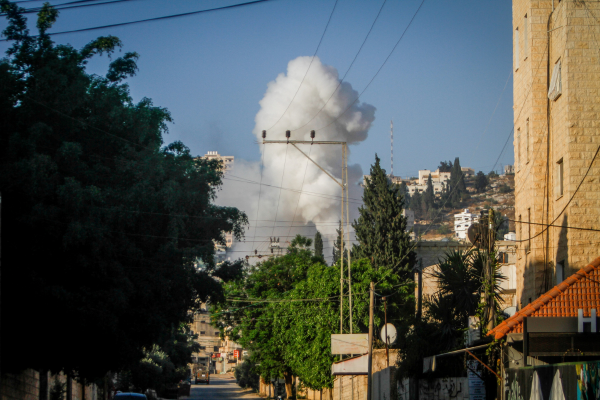HonestReporting was forced to call out many international media outlets where their coverage of the Jenin raid fell short.
By Rachel O’Donoghue, The Algemeiner
Overnight on July 3, the IDF launched what it described as a contained and precise operation to foil terrorist activity in the Jenin area, which consisted of surprise attacks on terrorist infrastructure in a West Bank (Judea and Samaria) city that has been dubbed the Palestinian “terror capital.”
Initially, the operation saw approximately 2,000 soldiers deployed, as well as drones that were used to carry out precision strikes designed to clear a path for forces on the ground.
After the initial launch of the operation on Monday, at least eight Palestinians — seven of whom have been claimed by terror groups — were killed in the raid.
Predictably and depressingly, HonestReporting was forced to call out many international media outlets where their coverage of the Jenin raid fell short.
Operation vs. Attack
The New York Times, BBC, The Washington Post, and CNN all failed to highlight the nature and scope of the Israeli operation in Jenin in their headlines, variously referring to it as a series of “strikes,” an “assault,” and a “deadly raid,” while the fact that Jenin is a hotbed of terrorist activity was noted in just one headline— by the Associated Press (describing Jenin as a “militant stronghold”).
Such headlines give readers the false impression that Israel has indiscriminately targeted Palestinians in Jenin, as opposed to launching a counter-terrorism operation designed to destroy terror infrastructure and and to apprehend armed suspects.
The BBC fell short of its duty to report the full, unbiased facts, when it aired footage of the Palestinian “Prime Minister” Mohammad Shtayyeh claiming Israel was trying to “erase [Jenin] refugee camp completely.” The BBC hosts and staff failed to challenge or contextualize the obviously false assertion.
Several outlets, including the Associated Press and The Daily Mail, sought to cast doubt on whether the operation was indeed for the purpose of destroying terrorist infrastructure, with the former suggesting the IDF may have struck a “crowded area,” and the latter adding an air of ambiguity by using inverted commas around the word “counterterrorism” in its headline.
Terrorism vs. Resistance
The Washington Post oxymoronically labeled Jenin the “center for armed Palestinian resistance,” perhaps forgetting that gun-toting terrorists entering Israel proper — as a number of terrorists from Jenin have — to murder Israeli civilians is a far cry from “resistance.”
In addition, The Washington Post also claimed Israel had “invade[d]” Jenin, despite Israel’s security incursions being a legal obligation.
Similarly, the issue of the legality of the operation was muddled by The Daily Mail, which erroneously claimed that the IDF was operating against the law in carrying out its obligation to prevent terrorism.
Meanwhile, The New York Times’ muted description of Jenin as a “center of Palestinian militancy,” inadequately explained how the city has morphed into a terror hub from which attacks on innocent Israeli civilians are orchestrated.
The Times later amended the headline of its story — which initially called the operation an “assault” — to “Israel Unleashes Fiercest Air Attack on West Bank in Nearly Two Decades,” in what was clearly an attempt to ratchet up the tension.
Victims vs. Terrorists
Finally, woefully few media outlets actually reported that seven of the eight casualties of the initial Jenin raid were affiliated with terrorist organizations.
Despite pictures of the men clutching guns circulating online, most mainstream news organizations simply referred to the dead men as “Palestinians” without identifying their terrorist connections.
The author is a contributor to HonestReporting, a Jerusalem-based media watchdog with a focus on antisemitism and anti-Israel bias — where a version of this article first appeared.
